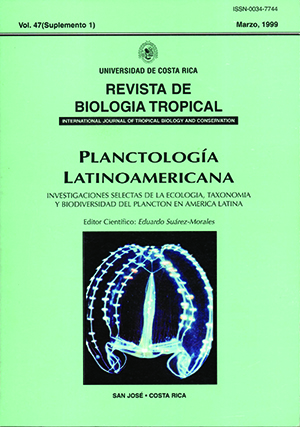Abstract
The integumental pore pattern is an assemblage of systcmatic characters of greatest taxonomic importance: this pattern is known as "integumental pores signature" because il is specific. The integumental pore pattern in postlarvae with three and tour rostral spines of Penaeus vannamei from Mexico and Panama was examined. Twenty postlarvae of each stage were cleaned with KOH and stained with Chlorazol Black E. Each one showed a characteristic pattern which allowed distinction of two graups: Sinus Californiensis and Panamensiso refering to their original biogeographic provinces. The pores were distributed in a bilateral and symmetrical arrangement. The Mexícan postlarvae with three rostral spines showed 626 largc and 40 small pores, while those fram Panama showed 522 large and 34 small pores. The Mexican postlarvae with four rostral spines had 805 large and 96 small pares, while those of Panama presented 725 large and 86 small pores. The most relevant differences between the postlarvae were found in the cephalothorax pore complexes and in the central arcas of the abdominal segments.References
Cabrera-Jirnénez, J. A. 1983. Characteres of taxonomic values of the postlarvas of the shrirnps. Penaeus (farfontepenaeus) brevirostris Kinsley (Decapoda Natantia) of the Gulf of California, México. Crustaceana. 44: 292-300.
Fleminger, A. 1973. Pattern, number, variability and taxonomic significance of integurnental organs (sencilla and glandular pores) in the genus Eucalanus (Copepoda, Calanoida). Fish. Bull. 71:965-1010.
Fleminger, A. & K. Hulsemann. 1977. Geographical Range and Taxonomic Divergence in North Atlantic Calanus (C. helgolandicus, C.finmarchicus and C. glacialis). Mar. Biol. 40:233-248.
Koomen, P. 1991. Integumental organs in the oral cavity of Euchirella messinensis (Claus, 1863) (Copepoda: Calanoida). Bull. Plankton Soc. Japan, Spec. Vol. 437-450.
Koomen, P. 1992. The integumental perforation pattern of the Euchirella messinensis female (Copepoda, Calanoida): corrections additions, intraspecific variation, and a checklist ofpore sites. Crustaceana, 63:113-159.
Martínez-Córdoba, L.R., 1993. Camaromcultura: bases técnicas y científicas para el cultivo de camarones peneidos. A.G.T., México, 233 p.
Mauchline, J. 1987. Taxonomic value of pore pattern in the integument of calanoid copepods (Crustacea). J. Zool., Londres. 214: 697-749.
Park, J. S. 1995. The development of integurnental pore in the genus Pleuromamma (Copepoda: Calanoida). J. Mar. BioL Ass. U.K. 75: 211-218.
Ringo, R. D. & G. Zamora. 1968. A Penaeid postlarval character of taxonomic value. Bull. Mar. Sci. 18: 471-476
##plugins.facebook.comentarios##

This work is licensed under a Creative Commons Attribution 4.0 International License.
Copyright (c) 1999 Revista de Biología Tropical


